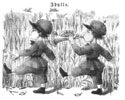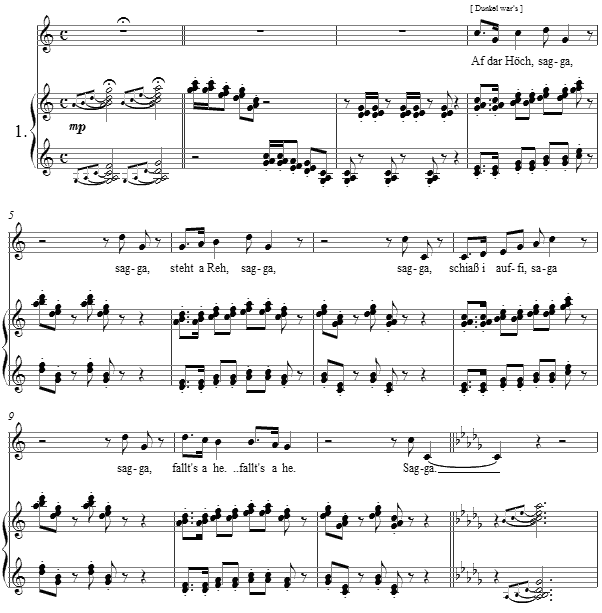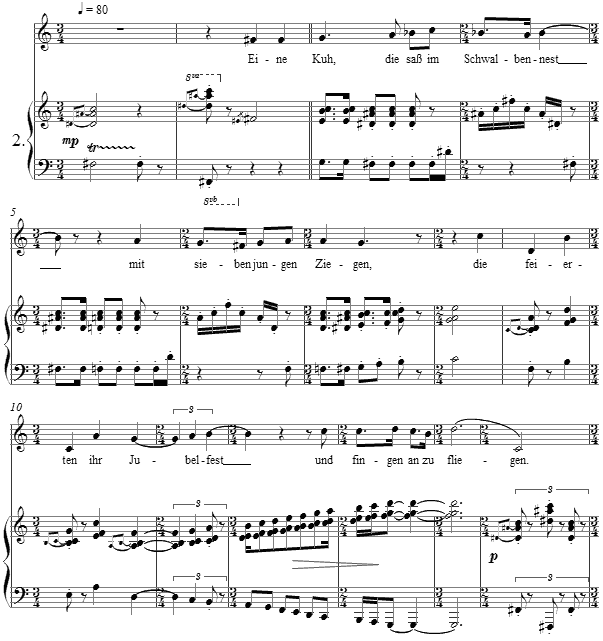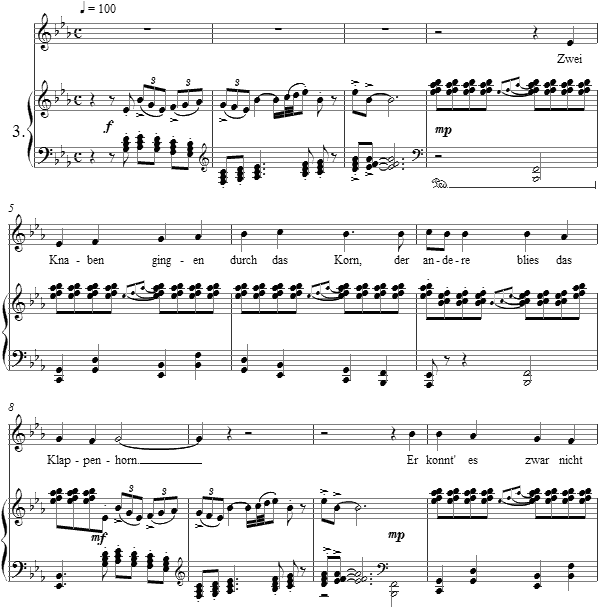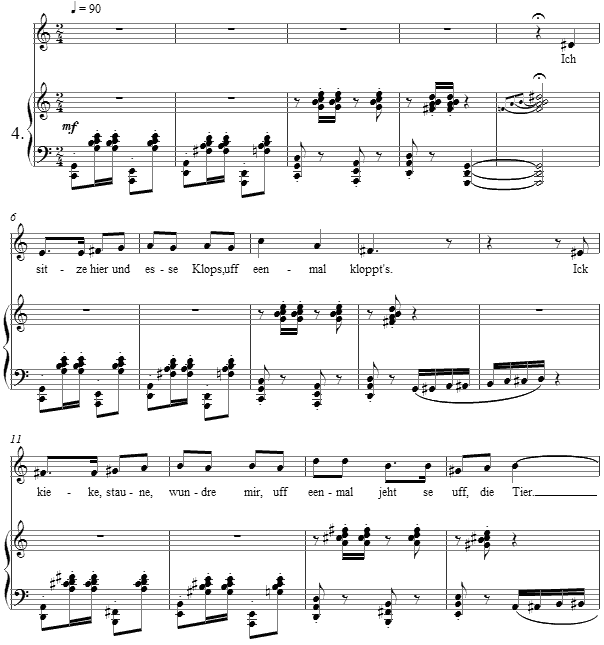Music and Texts of GARY BACHLUND
Vocal Music | Piano | Organ | Chamber Music | Orchestral | Articles and Commentary | Poems and Stories | Miscellany | FAQs
Vier Unsinn-lieder - (2010)
anonymous texts
for medium voice and piano
i. Sagga-lieder - [ 2 pages, circa 1' 15" ]
Af dar Höch, sagga,
Steht a Reh, sagga,
Schiaß i auffi, sagga,
Fallt's a he.
In Berlin, sagt' er,
Mußt du fein, sagt' er,
Und geschiet, sagt' er,
Mußt du sein, sagt' er,
Denn da habens, sagt' er,
Viel Verstand, sagt' er,
Ich bin dort, sagt' er,
Schon bekannt.
ii. Kuh - [ 2 pages, circa 1' 10" ]
Eine Kuh, die saß in Schwalbennest,
Mit sieben jungen Ziegen,
Die feierten ihr Jubelfest
Und fingen an zu fliegen,
Der Esel zog Pantoffeln an,
Ist übers Haus geflogen,
Und wenn das nicht die Wahrheit ist,
So ist es doch gelogen.
iii. Klapphorn-Verse - [ 4 pages, circa 2' 15" ]
Zwei Knaben gingen durch das Korn,
Der andere blies das Klappenhorn.
Er konnt' es zwar nicht ordentilich blasen,
Doch blies er's wenigstens einigermaßen.
Zwei Knaben gingen durch das Korn,
Sie waren beide Feger des Schorn.
Der eine konnte gar nicht fegen,
Der andre fog brillant dagegen.
Zwei Knaben rieten kreuz und quer,
Wo kommen die Klapphornverse her?
Da sprach der andre: "Horch,
Die bringt der Klapphornstorch!"
iv. Icke! - [ 2 pages, circa 40" ]
Ick sitze hier und esse Klops,
Uff eenmal kloppt's.
Ick kieke, staune, wundre mir,
Uff eenmal jeht se uff, die Tier.
Nanu, denk ick, ick denk, nanu,
Jetzt isse uff, erscht war se zu.
Ick jehe raus und blicke,
Und wer steht draußen? -- Icke!
[ total duration - 10 pages, circa 5' 20" ]
Zwei Knaben
These public domain nonsense texts are newly collected in the Reclam edition, Deutsche Unsinnpoesie (1978). Two refer specifically to Berlin, one in the dialect of that era, and one mentioning the city itself. These silly settings are light-hearted entertainment to be sung in a classical style.
i. Said-he songs
There in the heights, said he,
Stood a buck, said he,
That I shot at, said he,
And felled it.
In Berlin, said he,
You'll do fine, said he,
And to shine, said he,
You must be there, said he,
That you may have, said he,
Much understanding, said he,
I am there, said he,
Already well-known.
The "Sagga-Lieder" became a collection of poems by many individuals over decades, much like limericks. Two are combined into one song text, the first echoing back to a deeper dialect, and the later collected by Karl von Holtei (1798-1880) in his song "Spiel" titled Weiner in Berlin (1824). The falling two beat pattern syncopates "sagga," or "sagt' er," as the setting changes key for the second "In Berlin."
ii: Cow
A cow, that sat in a swallow's nest,
With seven young goats,
Celebrated her anniversary
And began to fly.
The donkey has pulled up his pants,
And flown over the house,
And if that isn't the truth,
Then someone surely is lying.
The picture of a cow in a swallow's nest with its seven young goats, much less the trousered goat flying over the house, is in a long tradition of "lying" poems, wherein huge exaggeration is followed by some statement that "if it isn't true, it must be a lie." Another fine example of this is Lügenmärchen. The diatonic is answered by the wholly chromatic, as this setting refuses to sit down into its tonic until the final cadence.
iii. Klapphorn Verses
Two lads went through the corn,
As one blew a folding horn.
He couldn't exactly play it well,
But at least he was a little satisfied.
Two lads went through the corn,
They were wild little reapers.
The one wasn't adept at all,
Which made the other look brilliant.
Two lads rode here and there,
Wondering from whence come these Klapphorn verses?
One said to them other: "Listen,
They're brought by the Klapphorn stork!"
Like the "Sagga-Lieder" and limericks as mentioned above, the Klapphorn verses are found in many variations. Several are put together in this setting, which moves from a 4/4 meter to 6/8, then to 3/4 and returns to 4/4. The slight and very short parody on a horn call might be slightly familiar to some singers and devotees of opera.
iv. I!
I sit here, eating meatballs,
And it swings wide open.
I look, astonished and bewildered,
And rise to go to the door.
Okay, I says, says I, okay,
I'll finish eating, and then see.
I go out and look around,
And who's outside? - It's me!
The "meatball" song also references Berlin, this time in a Berliner dialect. With the infusion of linguistic markers from so many other cultures and the rowdy refusal of the lower classes to adopt Hochdeutsch, echoes of Yiddish and other languages linger. The pun on Tier -- animal -- is that it is in fact a phonetic spelling of Tür -- door -- as Berliners sometimes have pronounced the word. And when one goes outside to see who is outside, the commonsense answer is that at that point "I" am outside.
The score is available as a free PDF download, though any major commercial performance or recording of the work is prohibited without prior arrangement with the composer. Click on the graphic below for this piano-vocal score.
